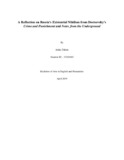| dc.contributor.advisor | Tahsin, Anika | |
| dc.contributor.author | Tahsin, Anika | |
| dc.date.accessioned | 2019-07-09T05:15:18Z | |
| dc.date.available | 2019-07-09T05:15:18Z | |
| dc.date.copyright | 2019 | |
| dc.date.issued | 2019-04 | |
| dc.identifier.other | ID 15103043 | |
| dc.identifier.uri | http://hdl.handle.net/10361/12324 | |
| dc.description | This thesis is submitted in partial fulfillment of the requirements for the degree of Bachelor of Arts in English, 2019. | en_US |
| dc.description | Cataloged from PDF version of thesis. | |
| dc.description | Includes bibliographical references (pages 33-34). | |
| dc.description.abstract | Crime and Punishment and Notes from the Underground are two remarkable novels written by Dostoevsky during the late nineteenth century. The novels centrally focus on the tale of poverty and suffering of Russia and how it triggered the philosophical theory of Existential Nihilism amongst the people during the nineteenth century. The author uses Rodion Romanovich Raskolnikov and the anonymous narrator from the underground as the representation of the nineteenth-century existential nihilist from Russia, St. Petersburg. Both of the characters radiate an extreme egocentric and arrogant attitude who prefers alienating themselves from society as they denied abiding by society’s requirement due to their disdain attitude towards it. Not only the characters but the city of St. Petersburg as well as supreme element that significantly features the emerging pessimism in Russia. The city is not merely a backdrop to these novels but an embodiment of misleading radical and moral ideas being introduced in Russia. It embodies the intense pessimism that condemned human existence during that time. Thus, the aim of this thesis is to explore and scrutinize the reasons and triggering factors of Existential Nihilism in Russia in the novels Crime and Punishment and Notes from the underground by scrutinizing Dostoevsky’s stand concerning social, political and moral state of affairs in Nineteenth-century Russia, his approach of sketching the characters of Raskolnikov and the underground man through their perceptions, actions and in addition the diction used in these novels. | en_US |
| dc.description.statementofresponsibility | Anika Tahsin | |
| dc.format.extent | 34 pages | |
| dc.language.iso | en | en_US |
| dc.publisher | BRAC University | en_US |
| dc.rights | Brac University theses are protected by copyright. They may be viewed from this source for any purpose, but reproduction or distribution in any format is prohibited without written permission. | |
| dc.subject | Dostoevsky | en_US |
| dc.subject | Notes from the Underground | en_US |
| dc.subject | Crime and Punishment | en_US |
| dc.subject.lcsh | English fiction--20th century. | |
| dc.title | A reflection on Russia’s existential nihilism from Dostoevsky’s crime and punishment and notes from the underground | en_US |
| dc.type | Thesis | en_US |
| dc.contributor.department | Department of English and Humanities, Brac University | |
| dc.description.degree | B.A. in English
| |

